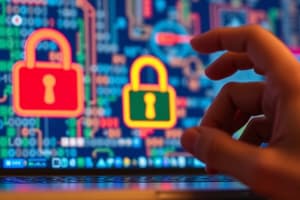Podcast
Questions and Answers
What is one of the most significant concerns for effective implementation of computer technology?
What is one of the most significant concerns for effective implementation of computer technology?
- Reducing software costs
- Maximizing data storage capacity
- Increasing internet speed
- Privacy, security, and ethics (correct)
Which of the following is a primary privacy issue mentioned in the content?
Which of the following is a primary privacy issue mentioned in the content?
- Data variety
- Accuracy (correct)
- Accessibility
- Availability
What does the property issue in privacy relate to?
What does the property issue in privacy relate to?
- Who owns the data (correct)
- The speed of data processing
- How data is stored
- The format of data
Which aspect is NOT a focus when discussing the impact of technology on privacy?
Which aspect is NOT a focus when discussing the impact of technology on privacy?
What is a potential negative impact of technology on people?
What is a potential negative impact of technology on people?
What term describes the ever-growing volume of data gathered about individuals by large organizations?
What term describes the ever-growing volume of data gathered about individuals by large organizations?
What is a common issue raised by the actions of information resellers?
What is a common issue raised by the actions of information resellers?
What is the primary function of employee-monitoring software?
What is the primary function of employee-monitoring software?
What misconception do most people have about their online activities?
What misconception do most people have about their online activities?
Which of the following is a method used to track web activity?
Which of the following is a method used to track web activity?
What is the main focus of computer security?
What is the main focus of computer security?
Which of the following describes a Trojan horse in cybersecurity?
Which of the following describes a Trojan horse in cybersecurity?
What primarily characterizes a botnet?
What primarily characterizes a botnet?
What are the three most common types of malware mentioned?
What are the three most common types of malware mentioned?
Which of the following is a role of antivirus programs?
Which of the following is a role of antivirus programs?
What are first-party cookies?
What are first-party cookies?
What are web bugs primarily used for?
What are web bugs primarily used for?
Which of the following is NOT a recommended defense against spyware?
Which of the following is NOT a recommended defense against spyware?
What type of spyware is considered the most invasive?
What type of spyware is considered the most invasive?
What can potentially happen due to posts made on social networking sites?
What can potentially happen due to posts made on social networking sites?
Flashcards are hidden until you start studying
Study Notes
Privacy
- Technology enables the compilation and use of various data, including personal information.
- Privacy concerns the collection and use of data about individuals.
- Three primary privacy issues:
- Accuracy: Ensuring data is correct.
- Property: Determining data ownership.
- Access: Controlling and managing access to data.
Privacy: Large Databases
- Large organizations gather and store information about people in large databases.
- Data collection forms the base of 'big data'.
- Information resellers or brokers collect, analyze, and sell personal data.
- They create electronic profiles describing individuals.
- Concerns exist about:
- Collecting public, personally identifying information.
- Spreading information without consent.
- Spreading inaccurate information.
Privacy: Private Networks
- Many organizations use employee monitoring software to track employee email and computer files.
- These programs record everything done on the computer.
Privacy: Internet & Web
- Browsing the internet presents privacy concerns.
- The illusion of anonymity is prevalent.
- Browsers store critical information on hard disks.
- This includes:
- History files: Locations of recently visited websites.
- Temporary internet files (cache): Web page content and display instructions.
Privacy: Internet & Web (Cookies)
- Cookies are small data files deposited from websites.
- Two types of cookies:
- First-party: Generated and read only by the current website.
- Third-party (tracking cookies): Usually generated by advertising companies affiliated with the website. Tracking your activity across various sites.
Privacy: Internet & Web (Other Threats)
- Web bugs: Invisible images or hidden HTML code to transmit information without knowledge.
- Spyware: Programs designed to secretly record and report online activities.
- They operate in the background, invisible to users.
- Computer monitoring software is the most invasive form.
- Keystroke loggers: Record all activity and keystrokes, including sensitive information.
Privacy: Internet & Web (Defense)
- Best defenses against spyware:
- Exercise caution while visiting new websites.
- Be careful about downloading software from unknown sources.
- Use antispyware programs to detect and remove various threats.
Privacy: Online Identity
- Online identity refers to information people voluntarily post about themselves online.
- This can involve posting about personal life, experiences, and opinions on social networking sites.
- This information can be used against individuals, leading to job losses or other consequences.
Security
- Security concerns protecting individuals and organizations from harm and theft.
- Computer security specifically focuses on protecting information, hardware, and software from unauthorized access.
- This includes preventing damage from intrusions, sabotage, and natural disasters.
Security: Cybercrimes
- Cybercrime involves computer and network-related criminal offenses.
- Malware: Malicious programs primarily designed to damage or disrupt computer systems.
- Crackers: Computer criminals who create and distribute malware.
Security: Cybercrimes (Malware Types)
- Three primary types of malware:
- Viruses: Destructive programs that attach to programs and databases to alter or delete files.
- Worms: Programs that replicate themselves to slow or stop computer and network operations. Worms can carry viruses.
- Trojan horses: Programs disguised as harmless but contain malicious programs like viruses. They often appear as free programs downloaded from the internet.
Security: Cybercrimes (Malware Spread)
- Viruses and worms can enter computers via email attachments and programs downloaded from the internet.
- Zombie: A computer infected with malware allowing remote control for malicious purposes.
- Botnet: A collection of zombie computers controlled as a network.
Security: Cybercrimes (Protection)
- Antivirus programs (Symantec, McAfee) provide services to track and alert users about virus threats.
Ethics
- Ethics establish standards of moral conduct.
- Ethics play a crucial role in controlling computer use and ensuring responsible actions.
- Ethical considerations guide developers, users, and organizations in making decisions regarding technology.
Studying That Suits You
Use AI to generate personalized quizzes and flashcards to suit your learning preferences.




